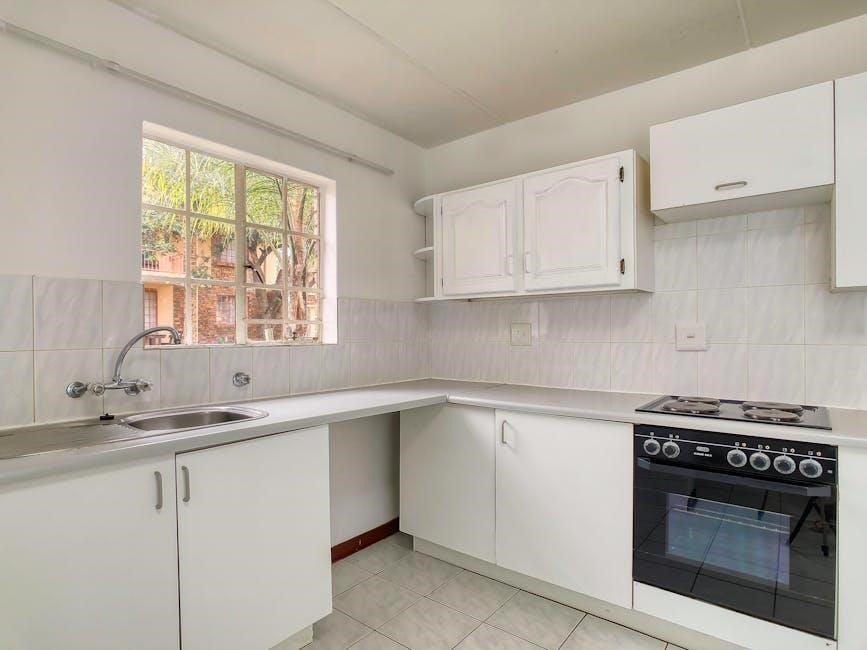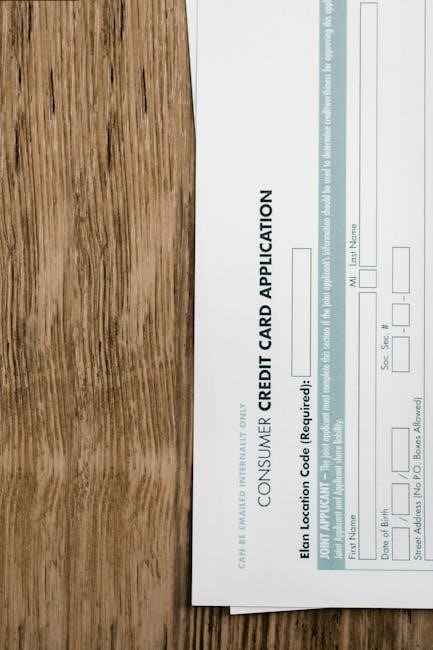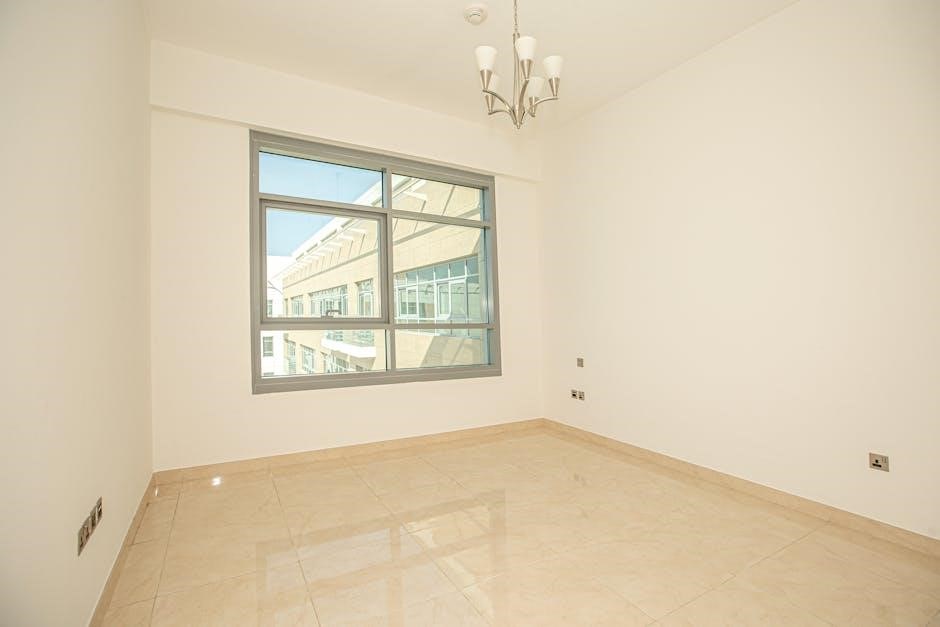The New Jersey Rental Application Form is a crucial document used by landlords to evaluate potential tenants. It ensures a fair and legal rental process, protecting both parties.
Overview of the Purpose and Importance
The New Jersey Rental Application Form serves as a vital tool for landlords to assess potential tenants thoroughly. Its purpose is to gather essential information, ensuring a fair and informed tenant selection process. This document is crucial for verifying applicants’ credibility, rental history, and financial stability, ultimately protecting both landlords and tenants by promoting transparency and legal compliance in rental agreements.
Legal Requirements for Landlords and Tenants in New Jersey
The New Jersey Rental Application Form must comply with state-specific legal standards, ensuring fair housing practices and non-discrimination. Landlords are required to follow anti-discrimination laws, including protections based on race, religion, disability, and familial status. Tenants must provide accurate information, while landlords must maintain confidentiality and adhere to regulations regarding application fees, security deposits, and eviction procedures to ensure legal compliance and fairness.

Key Components of the New Jersey Rental Application Form
The form includes essential sections for personal details, rental history, employment verification, credit checks, and legal disclosures to ensure comprehensive tenant screening and compliance.
Personal and Contact Information
The New Jersey Rental Application Form requires applicants to provide their full name, current address, phone number, and email. This section also includes fields for emergency contacts and identification details, ensuring landlords can verify identities and maintain accurate records for communication purposes.
Rental History and References
The New Jersey Rental Application Form includes a section for rental history, requiring applicants to list previous landlords, addresses, and tenancy dates. This helps landlords assess the applicant’s reliability and payment history. Applicants must also provide references, typically from prior landlords or property managers, to verify their tenancy and behavior during previous rentals.
Employment and Income Verification
The New Jersey Rental Application Form requires applicants to provide detailed employment information, including job title, employer name, and contact details. Income verification is essential, with applicants typically submitting recent pay stubs, W-2 forms, or bank statements. This section helps landlords assess the applicant’s financial stability and ability to meet rental obligations consistently and on time.
Credit Check and Background Screening
The New Jersey Rental Application Form allows landlords to conduct credit checks and background screenings. This process helps assess an applicant’s financial responsibility and legal history. By evaluating credit scores and criminal records, landlords ensure compliance with fair housing laws, avoiding discrimination while selecting reliable tenants.
Legal and Compliance Considerations
The New Jersey Rental Application Form must comply with state and federal laws, ensuring non-discrimination and fair housing practices. Landlords must adhere to regulations like the Fair Housing Act and New Jersey’s specific tenant rights protections. Failure to comply can result in legal consequences, emphasizing the importance of understanding and following these requirements carefully.

The Process of Completing a New Jersey Rental Application
Complete the form by providing accurate personal, rental, and employment details. Attach required documents and submit for landlord review, ensuring all sections are filled out correctly.
Steps to Fill Out the Application Accurately
To complete the form accurately, start by filling in your personal and contact information. Next, provide detailed rental history, including past addresses and landlord references. List current and previous employment, along with income verification. Ensure all sections, such as credit check authorization, are filled out completely. Review the application for accuracy, attach required documents, and submit it promptly to avoid delays in processing.
Required Documents and Attachments
Applicants should attach identification, proof of income, employment verification, and rental history. Including bank statements, pay stubs, and W-2 forms ensures completeness. A list of references and authorization for credit and background checks may also be required. Organizing these documents beforehand expedites the application process and improves the likelihood of approval.
Submission and Follow-Up Procedures
Submit the completed application with required documents via email, in-person, or online. Applicants should follow up within 3-5 business days to confirm receipt and status. Clear communication ensures timely processing. Applicants are responsible for ensuring all information is accurate and complete to avoid delays in approval.

Legal Requirements and Tenant Rights in New Jersey
The New Jersey Rental Application Form ensures legal compliance, protecting tenant rights and landlord interests. It streamlines tenant screening while adhering to state regulations and anti-discrimination laws.
Discrimination Laws and Protected Classes
New Jersey has strict anti-discrimination laws, ensuring landlords cannot reject applicants based on race, gender, age, religion, disability, or familial status. These protections apply to all rental application processes, safeguarding equal housing opportunities. Violations can lead to legal penalties, emphasizing the importance of compliance with fair housing regulations in tenant selection processes.
Security Deposit and Fees Regulations
New Jersey law requires landlords to store security deposits in a secure account and provide written notice to tenants. The deposit cannot exceed one month’s rent, and landlords must return it within 30 days of lease termination. Non-compliance can result in penalties, ensuring tenants’ financial protections and promoting fair rental practices statewide.
Eviction Policies and Tenant Protections
New Jersey eviction policies require landlords to follow strict legal procedures, ensuring tenants receive proper notice and court proceedings. Tenants are protected from unlawful evictions and retaliation. The state mandates fair treatment, safeguarding tenants’ rights and providing legal recourse to contest eviction actions, ensuring a balanced and just rental relationship for all parties involved.

Benefits of Using a New Jersey Rental Application Form
The form streamlines tenant screening, ensuring legal compliance and protection for both parties. It helps landlords evaluate applicants fairly while safeguarding tenant rights and interests effectively.
Streamlined Tenant Screening Process
The New Jersey Rental Application Form simplifies tenant screening by organizing applicant information, including personal details, rental history, employment, and credit checks. This structured approach enables landlords to efficiently evaluate candidates, ensuring fair and transparent decision-making while maintaining legal compliance and reducing delays in the rental process.
Protection for Both Landlords and Tenants
The New Jersey Rental Application Form provides mutual protection by ensuring transparency and legal compliance. Landlords can verify tenant information and assess financial reliability, while tenants are safeguarded from unfair discrimination and ensured a standardized evaluation process, fostering trust and accountability in the rental relationship.

Where to Find and Download the Form
The New Jersey Rental Application Form can be downloaded from official state websites, legal document databases, or online platforms offering free customizable templates for landlords.
Official State Websites and Resources
Official state websites and government resources provide reliable access to the New Jersey Rental Application Form. Platforms like the New Jersey Department of Community Affairs and local county websites offer free, downloadable templates. These sources ensure compliance with state laws and regulations, making them a trusted option for landlords and property managers seeking accurate and legally valid forms.
Legal Document Databases and Platforms
Legal document databases like LexisNexis and Forms… offer valid and customizable New Jersey Rental Application Forms. These platforms provide accessible templates that comply with state laws, ensuring accuracy and legal compliance. They are reliable sources for landlords seeking professional and enforceable rental application forms tailored to New Jersey’s specific requirements.
Online Templates and Customizable Options
Online platforms like LegalZoom and Rocket Lawyer offer customizable New Jersey Rental Application templates. These templates are designed to meet state-specific requirements and can be tailored to suit individual landlord needs. They provide a cost-effective and efficient way to create professional rental applications, ensuring compliance with New Jersey’s legal standards while saving time and effort.

Best Practices for Landlords in New Jersey
Landlords should conduct thorough tenant screening, maintain clear communication, and use state-specific rental forms to ensure compliance with New Jersey’s legal requirements and avoid disputes.
Thorough Tenant Screening Processes
Landlords in New Jersey should implement detailed tenant screening, including verifying rental history, employment, and credit reports. This ensures compliance with fair housing laws and helps assess a tenant’s reliability. Conducting thorough background checks and reviewing financial stability can prevent potential issues and ensure a smooth rental experience for both parties.

Clear Communication and Transparency
Clear communication and transparency are essential for a positive landlord-tenant relationship. Landlords should provide detailed information about the rental process, including fees, lease terms, and expectations. Being open about policies and procedures ensures trust and compliance, fostering a respectful and legally sound rental environment for all parties involved in New Jersey.

Common Mistakes to Avoid When Filling Out the Form
Common mistakes include incomplete or inaccurate information, missing signatures, and outdated forms. Ensure all fields are filled correctly and required documents are attached to avoid delays or legal issues.
Incomplete or Inaccurate Information
Providing incomplete or inaccurate information on a New Jersey rental application can lead to delays or rejection. Ensure all fields, such as contact details, rental history, and employment information, are filled accurately. Missing or incorrect data may result in processing issues or denial of tenancy, emphasizing the importance of thoroughness when completing the form.
Missing Signatures or Dates
Missing signatures or dates on a New Jersey rental application can delay processing or lead to rejection. Ensure all required fields are completed, including applicant signatures and dates, to avoid complications. Incomplete submissions may result in additional follow-up, highlighting the importance of attention to detail when finalizing the application.

The Importance of a Rental Application in New Jersey
The New Jersey Rental Application Form is essential for screening tenants, ensuring a fair and legal process. It protects both parties and verifies credibility, maintaining a formal relationship.
Ensuring a Smooth Rental Process
The New Jersey Rental Application Form streamlines tenant screening by collecting essential information, such as rental history, employment, and credit details. This standardized approach helps landlords evaluate applicants fairly and efficiently, reducing disputes and ensuring compliance with legal requirements. A well-structured application process fosters clear communication, protecting both parties and promoting a professional rental relationship from the start.
Protecting Both Parties Legally
The New Jersey Rental Application Form ensures legal protection for both landlords and tenants by outlining clear terms and compliance with state laws. It helps prevent discrimination, ensures fair housing practices, and provides a documented record of tenant eligibility. This form safeguards landlords by verifying applicant credibility while protecting tenants’ rights under New Jersey rental laws and regulations.

